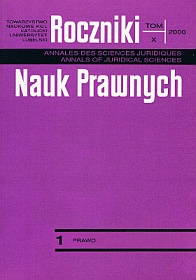Some Remarks on the Bill of Transforming A Cooperative into a Company of Commercial Law
Abstract
The paper deals with the bill of transforming a cooperative into a joint-stock company or a limited liability company. The causes have been given which justify the preparation of the bill. These are, among other things, some difficulties in gaining new capitals on the part of the cooperative. It has been noted that if a cooperative has other purposes than those of a limited liability or joint-stock company, then its transformation does not mean only to change the legal form of the subject but also to change its goal. It has been emphasized that both a company and a cooperative are corporate legal persons.
The questions concerning the process of transformation have been presented. That process starts the moment an appropriate resolution has been made, a resolution designed to appoint, among other things, a transformation commission. Its purpose consists in preparing documents being the basis for transformation. The statutory condition of transformation is to estimate the property of a cooperative, and that estimation should be carried out according to the regulations of the law of accountancy. It should be noted that during transformation it is not allowed to include any component of the property from the time it has been made part of the company under formation. An exception from that principle being the return of the so-called optional shares.
The paper discusses the rights and duties of the current and former members of a cooperative in the context of the transformation.
Then it goes no to depict the problems of transformation. In order to transform, one has to make a resolution to accept some documents which are the basis of transformation and are prepared by the transformation commission. Then it is necessary to pass a resolution to establish a company which should be minuted by a notary. At the moment of passing the above resolution, the general assembly of the members of a cooperative is transformed into an assembly of partners, shareholders-founders. Thus established company possesses its own basic capital (initial or emergency). The project anticipates also the formation of emergency capitals. The transformation closes with registration. At the moment when a cooperative ceases to exit of the subject of law, it starts to exist as a cooperative.
Copyright (c) 2000 Roczniki Nauk Prawnych

This work is licensed under a Creative Commons Attribution-NonCommercial-NoDerivatives 4.0 International License.


